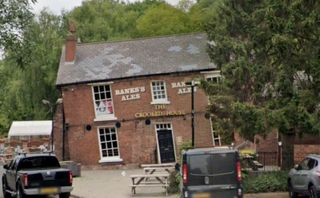Calls for 'Crooked House law' to protect Britain's heritage buildings
Following the destruction of the Crooked House, an 18th-century pub that was set to be evaluated for listing, there have been calls to bring in greater protections to protect properties not only when listed, but during the listing process

The burning and demolition of The Crooked House has led to calls to bring greater protections for Britain's heritage buildings by introducing a 'Crooked House law'.
The Crooked House Pub, built in 1765, was known for its slanted architecture caused by subsidence leading it to be known as “Britain’s wonkiest pub”. However, after being purchased by property developers, the Crooked House, in Himley, West Midlands, burned down on August 5 and was demolished without permission on August 7.
The incident has prompted debate on whether greater protections are needed for Britain's historic buildings and whether there should be a change in planning laws to ensure similar incidents do not happen again, which could have a significant effect on anyone thinking ofbuying a listed building— or one that may becomes listed in the future.
What happened to the 'Crooked House'?
Just two weeks after its purchase from Marstons brewery, the Crooked House, recently submitted for Historic England listing consideration, was engulfed in a fire. Within 24 hours of the fire, the pub was demolished.
A 66-year-old man, from Dudley, and a 33-year-old man, from Milton Keynes, were arrested in August on suspicion of arson with intent to endanger life and a third 55-year-old man was arrested in September on suspicion of conspiracy to commit arson with intent or being reckless as to whether life was endangered. All have since been released on conditional bail while Staffordshire Police continue to investigate.
Meanwhile, South Staffordshire Council is investigation the unauthorised “demolition of the entire building, without appropriate permissions”.
What are the current planning laws for heritage buildings?
The current planning laws make changing the use of listed buildings incredibly difficult for developers, but for those waiting to be listed, there are no protections.
Gaininglisted building consentto make any changes or alterations to a listed property is notoriously difficult, however, because the Crooked House was not yet listed, almost any destruction short of demolition can then still be justified as permitted development.
This can leave many buildings at risk of being changed before they can gain listed status. In this case, as the building was destroyed, very little heritage value was left meaning it is unlikely to get listed and is treated as unworthy of protection.
Landowners are also notified in advance of any intent to consider their properties for listing.
In addition to this, in 2017 planning laws were changed so that pubs in England could not be converted or demolished withoutplanning permission.
In 2016, the Welsh Assembly implemented Interim Protection for Wales, which automatically provides temporary safeguards once a building is submitted for listing consideration. Any subsequent damage to the building is expressly prohibited.
This legislation was modelled after the2008 draft Heritage Protection billin England, but this never became law.
'Our historic buildings are not protected adequately'
The incident has called for changes in the planning laws with MPs suggesting a 'Crooked House law' to protect Britain's historic buildings.
Marco Longhi, the Conservative MP for Dudley North, told an audience of more than 100 people that the council was pursuing enforcement action against those responsible and that he was also taking the issue to Michael Gove, Secretary of State for Levelling Up, Housing and Communities.
He stated: “I don’t believe our current legislative framework is strong enough. You have my cast iron guarantee that when Parliament is back in session, I will be knocking on Michael Gove’s door. I would love to see, in future, a Crooked House law.
“It is important we make a change in the law. Our historic pubs and buildings are not protected adequately. We need to change what we have in place now so the risk of what has already happened happening again is zero.
“Developers, and I’m not necessarily talking specifically about this case, may feel they can get away with it, but you have my assurance I will be pursuing this every day until we get that changed.”
Sir Gavin Williamson MP also suggested legal powers should be re-evaluated to aid the rebuilding of historical buildings and argued local authorities' ability to compel landowners is too limited.
The Crooked House's destruction could seemingly have a lasting impact on the way Britain's heritage buildings are used and developed.
Get the Homebuilding & Renovating Newsletter
Bring your dream home to life with expert advice, how-to guides and design inspiration, direct to your inbox.

News Editor Joseph has previously written for Today’s Media and Chambers & Partners, focusing on news for conveyancers and industry professionals. Joseph has just started his own self build project, building his own home on his family’s farm with planning permission for a timber frame, three-bedroom house in a one-acre field. The foundation work has already begun and he hopes to have the home built in the next year. Prior to this he renovated his family's home as well as doing several DIY projects, including installing a shower, building sheds, and livestock fences and shelters for the farm’s animals. Outside of homebuilding, Joseph loves rugby and has written for Rugby World, the world’s largest rugby magazine.
Most Popular


Bring your dream home to life with expert advice, how-to guides and design inspiration, direct to your inbox.
Thank you for signing up to Homebuilding. You will receive a verification email shortly.
There was a problem. Please refresh the page and try again.